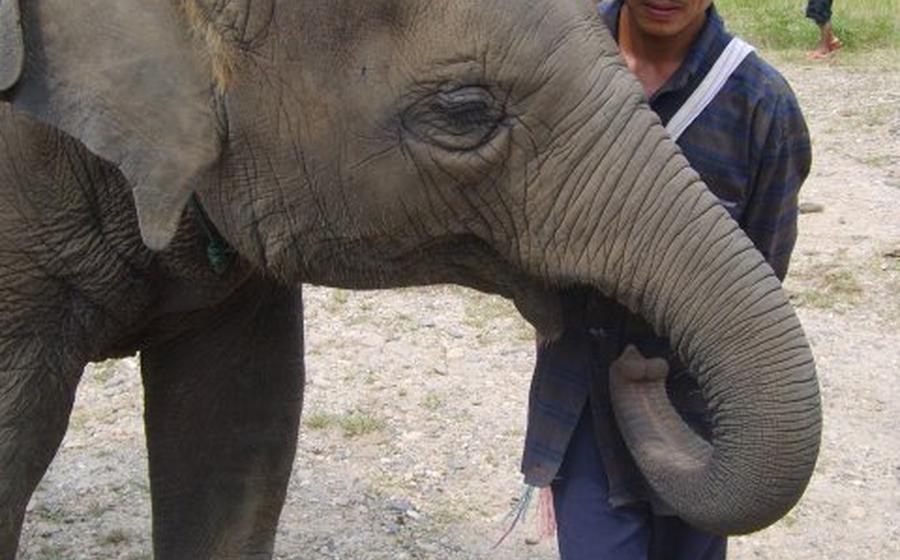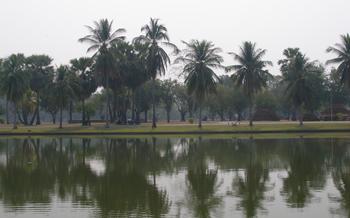
Elephant Nature Park
- Elephant Nature Park: A Haven for Majestic Creatures
- Elephant Encounters: A Once-in-a-Lifetime Experience
- Elephant Bathing: A Refreshing Experience for Both Elephants and Visitors
- Elephant Feeding: A Chance to Nourish Gentle Giants
- Elephant Walking: A Serene Journey Through the Jungle
- Elephant Conservation: A Crucial Mission for the Park
- Elephant Hospital: Providing Specialized Care for Elephants in Need
- Mahouts: The Unsung Heroes of Elephant Care
- Elephant Shows: A Showcase of Intelligence and Grace (Optional)
- Elephant Rides: A Controversial Practice
- Volunteering at the Park: A Rewarding Experience
- Elephant Souvenirs: Supporting Conservation Through Sustainable Shopping
- Photography Tips: Capturing the Beauty of Elephants
- What to Wear and Bring: Preparing for Your Visit
- Insider Tip: The Best Time to Visit
Elephant Nature Park: A Haven for Majestic Creatures
Nestled in the lush forests of northern Thailand, the Elephant Nature Park is a sanctuary dedicated to the rescue, rehabilitation, and protection of elephants. Founded in 1996 by Lek Chailert, a renowned Thai conservationist, the park has become a beacon of hope for these majestic creatures, providing a safe haven from the often-harsh realities of life in captivity.
The park's mission is rooted in the belief that elephants deserve to live free from exploitation and abuse. With a team of dedicated staff and volunteers, the Elephant Nature Park works tirelessly to rescue elephants from circuses, logging camps, and trekking operations, where they may have endured years of mistreatment and suffering. Once at the park, the elephants receive expert care and rehabilitation, allowing them to heal both physically and emotionally.
Visitors to the Elephant Nature Park have the unique opportunity to interact with these gentle giants in a truly ethical and sustainable way. Through various programs and activities, guests can learn about elephant behavior, anatomy, and their significance in Thai culture, while also contributing to their ongoing care and conservation.
The park's commitment to elephant welfare extends beyond its rescue and rehabilitation efforts. It actively engages in conservation initiatives, working to protect wild elephant populations and their natural habitats. Through research, education, and advocacy, the Elephant Nature Park strives to raise awareness about the threats facing elephants and promote coexistence between humans and these magnificent animals.
Elephant Encounters: A Once-in-a-Lifetime Experience
The Elephant Nature Park offers a range of ethical elephant encounters that allow visitors to interact with these majestic creatures in a safe and respectful way. These encounters include bathing, feeding, and walking with elephants, providing a unique opportunity to learn about their behavior, anatomy, and significance in Thai culture.
One of the most popular encounters is the elephant bathing experience, where visitors can help bathe the elephants in a nearby river. This is a refreshing and rewarding experience for both the elephants and the visitors, who get to create a special bond with these gentle giants.
Another highlight is the elephant feeding experience, where visitors can offer the elephants a variety of nutritious snacks, such as bananas, sugarcane, and rice balls. This is a great way to learn about the elephants' diet and witness their feeding habits up close.
For a more immersive experience, visitors can opt for the elephant walking experience, where they can walk alongside elephants in their natural habitat. This is a serene and unforgettable journey that allows visitors to observe elephant behavior in a more natural setting and learn about their social dynamics.
All of the elephant encounters at the park are conducted under the supervision of experienced mahouts, who ensure the well-being of the elephants and provide visitors with valuable insights into their care and behavior. These encounters are designed to promote ethical interactions between humans and elephants, while also raising awareness about the importance of elephant conservation.
Elephant Bathing: A Refreshing Experience for Both Elephants and Visitors
Elephant bathing is an integral part of the elephants' daily routine at the Elephant Nature Park. It serves not only as a way to keep them clean and cool but also as a form of enrichment and bonding experience. Visitors to the park have the unique opportunity to participate in this process and create a special connection with these gentle giants.
The elephants are led to a shallow pool or river, where they eagerly submerge themselves in the cool water. Visitors can help bathe the elephants using buckets or hoses, gently pouring water over their massive bodies and scrubbing them with soft brushes. The elephants visibly enjoy this process, flapping their ears, swaying their trunks, and occasionally spraying water at their human companions.
Bathing the elephants is also an excellent way to learn about their anatomy and behavior. Visitors can observe the elephants' thick, wrinkled skin, which helps them regulate their body temperature and protect them from insects. They can also see the elephants' long trunks, which they use for breathing, smelling, drinking, and manipulating objects.
After their bath, the elephants often roll around in the mud or dust to dry off, creating a protective layer on their skin. This behavior also helps to keep them cool and prevent sunburn. Visitors can watch the elephants wallow and play in the mud, enjoying this playful side of their nature.
Elephant bathing is a truly unique and memorable experience that allows visitors to connect with these amazing creatures on a deeper level. It is a chance to witness their intelligence, playfulness, and resilience, while also contributing to their well-being.
Elephant Feeding: A Chance to Nourish Gentle Giants
Elephants, like all living beings, require a balanced and nutritious diet to maintain their health and well-being. At the Elephant Nature Park, visitors have the unique opportunity to participate in feeding these gentle giants and witness their feeding habits up close.
The park provides a variety of food for the elephants, including fruits, vegetables, and specially formulated pellets that meet their nutritional needs. Visitors can help to feed the elephants by offering them pieces of fruit or vegetables, or by assisting the mahouts in preparing and distributing their meals.
Feeding the elephants is not only a fun and interactive experience, but it also allows visitors to learn about their dietary preferences and the importance of a healthy diet for their overall well-being. The elephants at the park are fed twice a day, and visitors can participate in either the morning or afternoon feeding session.
Here are some tips for making the most of your elephant feeding experience:
- Choose the right food. The elephants at the park are fed a variety of fruits, vegetables, and pellets. Some of their favorite fruits include bananas, apples, and watermelon. Vegetables like carrots, sweet potatoes, and cucumbers are also popular.
- Offer food gently. When offering food to an elephant, be sure to do so gently and slowly. Elephants have sensitive trunks, and they may startle if you move too quickly or abruptly.
- Respect the elephants' space. When feeding the elephants, be sure to stand at a safe distance and avoid getting too close. Elephants are large animals, and they can easily knock someone over if they feel threatened.
- Enjoy the experience. Feeding the elephants is a unique and rewarding experience. Take your time, enjoy the interaction, and learn as much as you can about these amazing animals.
Elephant Walking: A Serene Journey Through the Jungle
Imagine embarking on a tranquil journey through the lush jungles of Chiang Mai, accompanied by majestic elephants. At the Elephant Nature Park, you have the unique opportunity to walk alongside these gentle giants in their natural habitat. This experience offers a profound connection with both the elephants and the stunning surroundings.
As you walk side-by-side with the elephants, you'll witness their graceful movements and learn about their social dynamics. Observe how they interact with each other, forming deep bonds and communicating through subtle body language. You'll also gain insights into their intelligence and curiosity as they explore the jungle, foraging for food and bathing in the rivers.
To make the most of your elephant walking experience, choose the right time of day. Early mornings or late afternoons are ideal, as the temperatures are cooler and the elephants are more active. Wear comfortable clothing and sturdy shoes that you don't mind getting dirty.
As you walk, take your time and savor the tranquility of the jungle. Listen to the sounds of the forest, the rustling of leaves underfoot, and the gentle trumpeting of the elephants. Embrace the serenity of the moment and let the beauty of nature wash over you.
Elephant Conservation: A Crucial Mission for the Park
The Elephant Nature Park is dedicated to the conservation of elephants in Thailand and plays a vital role in rescuing and rehabilitating elephants that have been subjected to harmful situations, such as logging, trekking, and circuses. The park provides a safe haven for these gentle giants, allowing them to live in a natural and protected environment.
The park's conservation efforts extend beyond providing sanctuary for rescued elephants. It actively works to raise awareness about the threats facing elephants in Thailand, including habitat loss, poaching, and the illegal wildlife trade. Through educational programs and collaborations with local communities, the park aims to foster a greater understanding of the importance of elephant conservation and promote sustainable practices that protect these magnificent creatures.
Visitors to the Elephant Nature Park have the opportunity to contribute to elephant conservation through their visit. By booking a tour or participating in volunteer programs, visitors directly support the park's conservation initiatives. Additionally, the park operates a sustainable gift shop where visitors can purchase elephant-friendly souvenirs that benefit conservation efforts.
The Elephant Nature Park's commitment to elephant conservation is evident in the success stories of the elephants that have been rescued and rehabilitated at the park. Many of these elephants have suffered physical and emotional trauma as a result of their past experiences, but thanks to the care and expertise of the park's staff, they have been able to heal and thrive in a safe and loving environment.
By supporting the Elephant Nature Park, visitors can play a crucial role in ensuring the survival of elephants in Thailand and contribute to the preservation of these majestic creatures for future generations.
Elephant Hospital: Providing Specialized Care for Elephants in Need
The Elephant Nature Park houses a state-of-the-art elephant hospital, providing specialized care for elephants in need. This facility is equipped with advanced medical equipment and a team of experienced veterinarians who are dedicated to treating a wide range of injuries and illnesses that elephants may encounter.
The hospital admits elephants from various backgrounds, including those rescued from harmful situations, such as logging camps or circuses, as well as elephants that have suffered injuries or illnesses in the wild. The team of veterinarians conducts thorough examinations, diagnoses, and administers appropriate treatments, ensuring the elephants receive the best possible care.
Common conditions treated at the hospital include wounds, infections, dental problems, and foot injuries. The veterinarians also provide specialized care for elephants with chronic conditions, such as arthritis or blindness. In addition, the hospital offers preventive care services, such as vaccinations and regular check-ups, to help maintain the elephants' overall health and well-being.
The elephant hospital plays a crucial role in ensuring the well-being of the elephants at the park and contributes to the conservation of elephants in Thailand. By providing specialized medical care, the hospital helps to rehabilitate injured or ill elephants and gives them a chance to live long and healthy lives. Visitors to the park can support the hospital's work by making a donation or sponsoring an elephant's medical care.
Mahouts: The Unsung Heroes of Elephant Care
In the world of elephant care, mahouts play an indispensable role, forming a profound bond with their elephant companions that goes beyond mere human-animal interaction. These skilled individuals are not just caretakers; they are partners, protectors, and teachers, devoting their lives to ensuring the well-being and happiness of the elephants under their charge.
Becoming a mahout requires immense dedication, patience, and understanding. It is a lifelong journey that involves learning the intricacies of elephant behavior, mastering training techniques, and developing a deep sense of empathy and respect for these gentle giants. The bond between a mahout and their elephant is built on trust, communication, and shared experiences, fostering a level of understanding that is truly remarkable.
Mahouts are responsible for providing daily care for their elephants, including feeding, bathing, and grooming. They also play a crucial role in the elephants' training and socialization, using positive reinforcement and gentle guidance to teach them essential skills and behaviors. The relationship between a mahout and their elephant is a symbiotic one, where both parties learn from and rely on each other.
The deep connection between mahouts and elephants is evident in the way they interact. Mahouts often communicate with their elephants using subtle body language and vocal cues, understanding their moods and needs instinctively. This level of communication allows them to work together seamlessly, whether it's during daily tasks, elephant encounters, or even in times of crisis.
The role of mahouts in elephant conservation cannot be overstated. They are the ones who ensure that the elephants receive proper care, nutrition, and medical attention. They also play a vital role in educating visitors about elephant behavior and the importance of conservation efforts. Through their dedication and expertise, mahouts are the unsung heroes who safeguard the well-being of elephants and contribute significantly to their preservation.
Elephant Shows: A Showcase of Intelligence and Grace (Optional)
Elephant shows have long been a popular tourist attraction, showcasing the incredible intelligence and grace of these majestic creatures. At the Elephant Nature Park, elephant shows are approached with the utmost care and consideration for the animals' well-being. The elephants are not forced to perform unnatural acts or tricks that could cause them harm or stress. Instead, the shows are designed to highlight the elephants' natural abilities and behaviors, such as their ability to paint, play musical instruments, and engage in interactive games.
Visitors to the park can witness these captivating shows while learning about elephant behavior and the importance of their conservation. The shows provide a unique opportunity to see elephants up close and appreciate their remarkable intelligence and grace. However, it's important to remember that elephant shows can be controversial, and visitors should consider the ethical implications before attending. The park's approach to elephant shows is designed to strike a balance between showcasing the elephants' abilities and ensuring their welfare. Visitors are encouraged to observe the shows with respect and understanding, appreciating the elephants' natural talents without compromising their well-being.
Elephant Rides: A Controversial Practice
The Elephant Nature Park does not offer elephant rides, as it strongly believes that this practice is unethical and harmful to elephants. Riding on an elephant's back can cause significant pain and discomfort to the animal, as their backs are not designed to carry weight. Elephants used for riding are often subjected to cruel training methods to make them submissive, and they may suffer from physical injuries and psychological distress.
Instead of riding elephants, the park offers alternative ways for visitors to interact with these gentle giants. Visitors can bathe, feed, and walk with elephants, all while respecting their natural behavior and well-being. These activities allow visitors to learn about elephant care and conservation, and to create a special bond with these amazing creatures.
If you are considering visiting an elephant sanctuary or park, it is important to do your research and choose a place that prioritizes elephant welfare. Look for sanctuaries that do not offer elephant rides, and that have a strong commitment to ethical elephant interactions and conservation.
Volunteering at the Park: A Rewarding Experience
Volunteering at the Elephant Nature Park offers a unique opportunity to contribute to elephant conservation firsthand. The park offers various volunteer programs tailored to different interests and skill sets, allowing you to make a meaningful impact while gaining valuable experience.
Volunteers might engage in tasks such as preparing food for the elephants, assisting with their daily care, planting trees to create new habitats, and supporting the park's educational programs. You'll work closely with the park's experienced staff, learning about elephant behavior, conservation practices, and the challenges facing these gentle giants.
The benefits of volunteering at the Elephant Nature Park extend beyond the direct impact on the elephants. Volunteers become part of a passionate community dedicated to protecting these magnificent creatures. You'll make lasting memories, forge deep connections with like-minded individuals, and gain a profound understanding of the importance of elephant conservation.
If you're passionate about elephants and wildlife conservation, volunteering at the Elephant Nature Park is an experience of a lifetime. It's an opportunity to make a real difference while immersing yourself in the beauty and wonder of the natural world.
Practical Information:
-
To volunteer at the Elephant Nature Park, you must be at least 18 years old and have a genuine interest in elephant conservation.
-
The park offers short-term and long-term volunteer programs, ranging from one week to several months.
-
Volunteers are responsible for their travel and accommodation expenses, but the park provides basic amenities such as food and lodging.
-
To apply for a volunteer position, visit the Elephant Nature Park website and fill out an application form.
Elephant Souvenirs: Supporting Conservation Through Sustainable Shopping
When visiting the Elephant Nature Park, you have the opportunity to support elephant conservation efforts by purchasing elephant-friendly souvenirs. These souvenirs are ethically sourced and made by local artisans using sustainable materials. By buying these souvenirs, you not only get a unique memento of your visit but also contribute to the well-being of elephants and the local community.
Look for souvenirs that are made from recycled materials or natural fibers, such as elephant dung paper or bamboo. Avoid buying souvenirs made from animal parts, such as ivory or fur, as these contribute to the poaching of elephants and other endangered animals.
Some popular elephant-friendly souvenirs include hand-painted elephant statues, woven elephant blankets, and elephant-themed jewelry. You can purchase these souvenirs at the park's gift shop or from local artisans in Chiang Mai.
By choosing to buy elephant-friendly souvenirs, you can help support ethical practices and conservation efforts that protect elephants and their habitats. Every purchase you make contributes to a brighter future for these magnificent creatures.
Photography Tips: Capturing the Beauty of Elephants
Elephants are majestic creatures, and capturing their beauty through photography is a rewarding experience. To take stunning elephant photographs, choose a camera with a long lens, allowing you to get close while maintaining a safe distance. Set your camera to a fast shutter speed to freeze the elephants' movements and a low ISO to minimize noise.
Patience is key when photographing elephants. Wait for the elephants to be in a relaxed and natural state, and avoid making sudden movements that might startle them. Observe their behavior and anticipate their movements to capture candid shots.
Respect the elephants' space and privacy. Do not get too close or use flash photography, which can be disruptive. Follow the park's guidelines for photography and always ask permission from the mahouts before taking pictures.
Remember, the most important thing is to enjoy the experience and create lasting memories of your encounter with these magnificent animals.
What to Wear and Bring: Preparing for Your Visit
When packing for your visit to the Elephant Nature Park, comfort and practicality should be your top priorities. Opt for loose, lightweight clothing that allows for freedom of movement, such as cotton t-shirts and shorts. Avoid wearing bright colors or patterns, as these can be distracting to the elephants.
Footwear is equally important. Choose closed-toe shoes that provide good support and traction, such as hiking boots or sneakers. You'll be doing a lot of walking and exploring, so make sure your shoes are comfortable and broken in.
Don't forget to bring along a hat, sunglasses, and sunscreen to protect yourself from the sun. Insect repellent is also a must, as mosquitoes and other insects can be prevalent in the jungle.
A camera is essential for capturing your special moments with the elephants. Bring a camera with a good zoom lens so you can get close-up shots without disturbing the elephants.
Finally, leave any sharp objects or food items at home. These items could be harmful to the elephants, so it's best to err on the side of caution.
By following these packing tips, you'll be well-prepared for your visit to the Elephant Nature Park and can focus on creating lasting memories with these majestic creatures.
Insider Tip: The Best Time to Visit
The best time to visit the Elephant Nature Park is during the dry season, which runs from November to April. During this time, the weather is pleasant, with warm days and cool nights, making it ideal for elephant encounters and jungle walks. The elephants are also more active during the dry season, as they are not as focused on finding food and water.
To avoid the crowds, it is best to visit the park on a weekday, as weekends and holidays tend to be busier. If you are visiting during the park's peak season, which is from December to February, it is advisable to book your visit in advance to secure your spot.
If you prefer a quieter experience, you can visit the park during the shoulder seasons, which are May-June and September-October. During these months, the weather is still good, but there are fewer visitors.
No matter when you choose to visit, the Elephant Nature Park offers a unique and unforgettable experience that will leave you with lasting memories of these majestic creatures.







